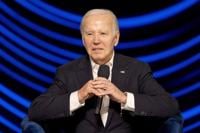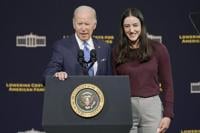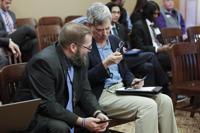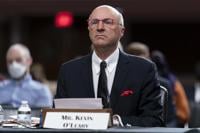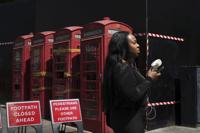NEW YORK (AP) — President Joe Biden’s simple act of sitting down while commemorating the 80th anniversary of D-Day in Normandy, France, gained more attention than the ceremony itself in some circles as social media users shared a shortened version of the clip to falsely claim he was reaching for a nonexistent chair.
The clip was the first of at least three out-of-context or trimmed videos shared widely over less than two weeks in June to fuel a narrative that Biden is mentally and physically unfit for office.
It’s long been standard practice in politics to spin real moments to make an opponent look bad. Yet the recent spate of misleading videos — which amassed millions of views and were picked up by right-leaning outlets around the world — shows how the reach of social media and real concerns about have made the tactic especially powerful in 2024.
Experts say voters can expect to see both Republicans and Democrats weaponizing unflattering, out-of-context moments to label each other’s presidential candidates as weak, confused or senile — especially considering of 81 and 78. Indeed, edited and misrepresented clips have also circulated about former President Donald Trump.
“Any misinformation that seems to reinforce or resonate perceptions or dominant narratives, whether they’re accurate or not, is very effective,” said Erik Nisbet, a professor at Northwestern University who studies media, public opinion and public policy in democracy and elections.
At the G7 summit in Italy, where Biden headed after Normandy, a clip of the president watching a skydiving demonstration was cropped to make it appear as though he wandered off for no reason. A wider view of the video shows he was greeting paratroopers who had just landed. And at a Los Angeles fundraiser last weekend, amid cheers was used to say the president froze, while Biden’s campaign said he was only stopping to take in the applause.
The clips have been especially effective at activating concerns about Biden’s competency, according to Nisbet, because he is the oldest sitting president the U.S. has ever had, and he moves with more difficulty than he once did.
Dr. Kevin O’Connor, Biden’s physician, wrote in a February memo that he “continues to be fit for duty” and that his stiff gait is the result of arthritic changes in his spine. He said that Biden has reported additional hip pain and started using a new device for his sleep apnea, but that he showed no signs of stroke, multiple sclerosis, Parkinson’s or other similar conditions.
After the fundraiser clip spread online, Biden campaign spokesperson James Singer blasted such negative characterizations as a tactic from those who “are so scared of losing to Joe Biden, they’ll make anything up" to distract voters from Trump's misdeeds.
White House press secretary Karine Jean-Pierre in a press briefing “cheap fakes," a term for videos edited using cheap video editing software rather than artificial intelligence.
Trump’s campaign has doubled down on the clips and circulated a meme that defined a “cheap fake” as “any unedited video of Joe Biden’s cognitive decline that the Biden administration does not want the public to see.”
Experts say these attacks can be iterative, with social media influencers and campaigns piling on one another.
“The attention economy within conservative media helps perpetuate these cycles of circulation and these sorts of misinformation and campaign messaging,” said A.J. Bauer, an assistant professor at the University of Alabama who studies conservative news.
For example, the Republican ���ϳԹ��� Committee posted a cropped version of the video of Biden at the G7 summit in Italy shortly after it happened, captioning the post, “What is Biden doing?” The RNC’s post was then shared by right-leaning media outlets — among them, Sinclair Broadcast Group syndicated stations and the New York Post, which embedded the RNC’s post in its story.
This clip was also picked up by publications abroad, including the tabloid The Sun in the U.K. and the newspaper Corriere della Sera in Italy. A pro-Trump super PAC on social media as proof that “the world is laughing at us.”
Joshua Tucker, a politics professor and co-director of the Center for Social Media and Politics at New York University, said that Republicans will likely run aggressively on concerns about Biden’s age, but they should expect Democrats to strike back at Trump, who is only a few years younger.
“Given some of Trump’s behavior of late, the RNC is playing with fire a little bit here,” Tucker said.
Biden’s campaign has begun reciprocating with attacks on Trump through its rapid response account on the social media platform X. On Thursday, it it claimed showed Trump “getting confused, lost, wandering off, and waving to nobody.”
The out-of-context post followed other left-wing efforts to use videos to paint Trump as confused, senile or attention seeking.
For example, social media users earlier this month used an image of Trump holding Donald Trump, Jr.'s hand at a rally last fall in Hialeah, Florida, as alleged proof that the former president needed to be escorted offstage. The captured the moment in full context, showing the father and son only briefly clasped hands in a greeting as Trump departed without help.
The fact that these images and videos have only simple edits or are misrepresented, rather than manipulated with editing software or artificial intelligence, gives them even more power in a moment when Americans are concerned about high-tech fakes, experts said.
“It’s persuasive because it’s not fabricated,” Nisbet said. “It’s simply distorted visual cues to create a false impression about what happened.”
At the debate next week — the first this cycle between the two leading candidates for president — both Trump and Biden will face pressure to show they remain healthy, sharp and fit to be president.
Both men , flubbing names, dates or facts. Health experts caution that such mix-ups can be common and exacerbated by stress. They also point out some cognitive aging is normal, including delay in memory retrieval. And Biden has , a challenge that to attack and .
Experts agree that most voters are unlikely to switch candidates based on misleading videos, but they said such misinformation could further entrench people in their beliefs or dampen their enthusiasm to participate in the political process.
“This election will not be about persuasion,” said Nisbet. “It’s about mobilizing — the Democrats mobilizing Democratic and Democratic-leaning voters, Trump and Republicans doing the same. And it’s going to be a close election.”
___
Associated Press writer Stephen Groves in Washington contributed to this report.
___
The Associated Press receives support from several private foundations to enhance its explanatory coverage of elections and democracy. See more about AP’s democracy initiative . The AP is solely responsible for all content.


